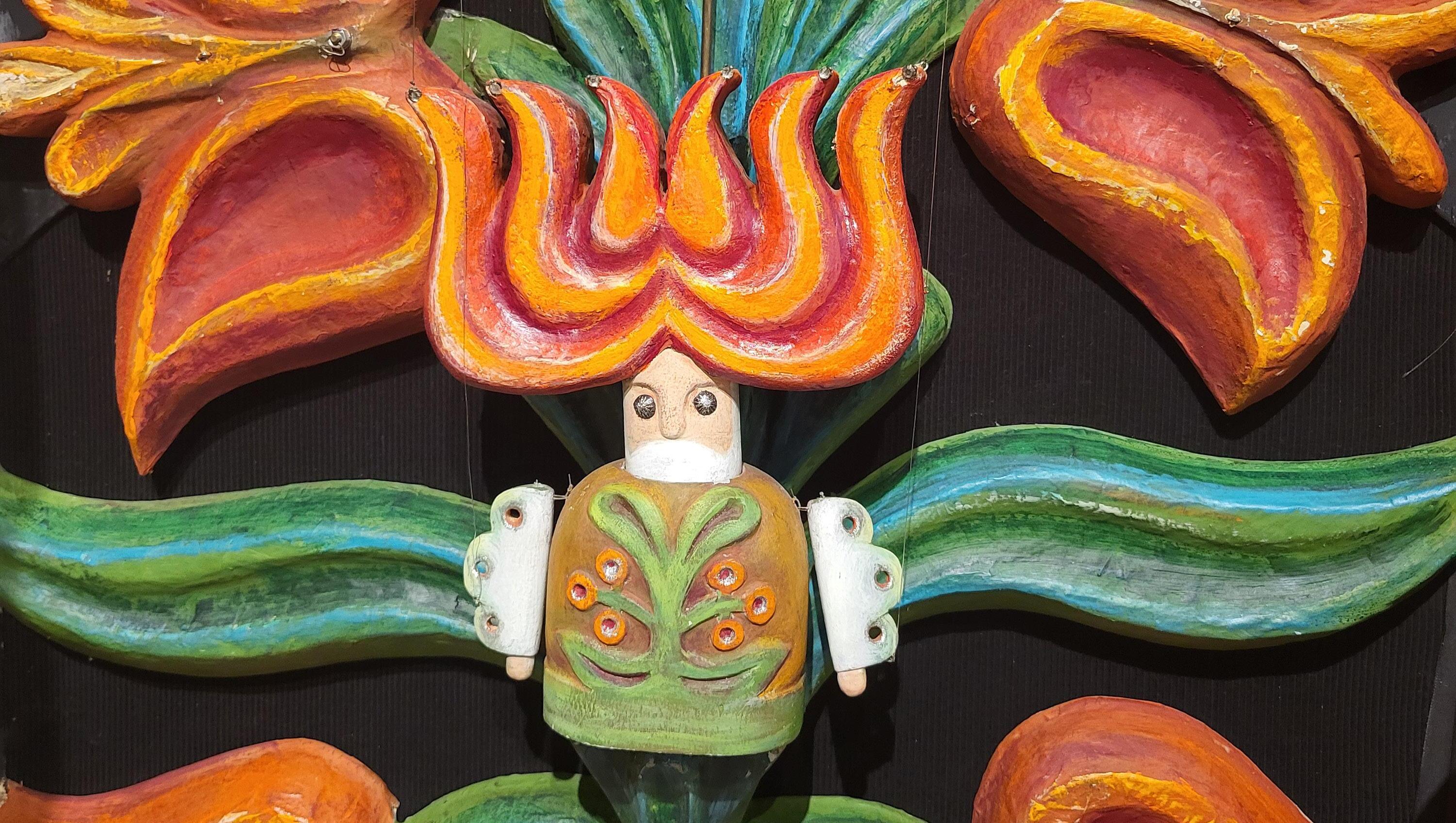

TALES
In addition to experimental performances aimed at adults, children’s plays are also created in the workshop of the Astra Puppet Ensemble. Several of these plays are authored by former members such as writer Veronika Marék, puppet director Gyula Urbán, and other creators from László Vízvári’s circle of friends.
The characters brought to life designed by Antónia Ősz Szabó and Iván Koós incorporate unique artistic solutions: their visual world, the use of materials, and visual diversity reflect the free and creative expression of the artists’ imagination. The formal experimentation and humorous associative solutions showcase the unlimited possibilities of puppet theatre: frogs made from knitted gloves, robbers with dish brush moustaches, soldiers with paper roll heads, an onion hero and a cherry prince, princes dazzling in seven colours, a forest gnome with tulip hair, jug-headed nobles, a striped cat, and a blue dog...
PRÓBÁLD KI!
PRÓBÁLD KI!
The performances feature a variety of puppet types. In the eastern themed Búbos vitéz and The Little Mukk, rod marionettes are used. In The Little Rooster’s Diamond Halfpenny, string puppets appear. The Seven Princes is staged with special giant flat puppets. The only pieces where they use glove puppets are fairy tale adaptations such as Little Onion, Blue Peter, Musical Boksz, Little Hedgehog and the Peaches, and Giant Squirrel.
TRY IT
PRÓBÁLD KI!
TRY IT
PRÓBÁLD KI!
STORY CUBE
SPIN THE STORY! WHAT ADVENTURES COULD OUR HEROES HAVE GOTTEN INTO? TELL US!
TRY IT
PRÓBÁLD KI!
TRY IT
TRY IT
PRÓBÁLD KI!
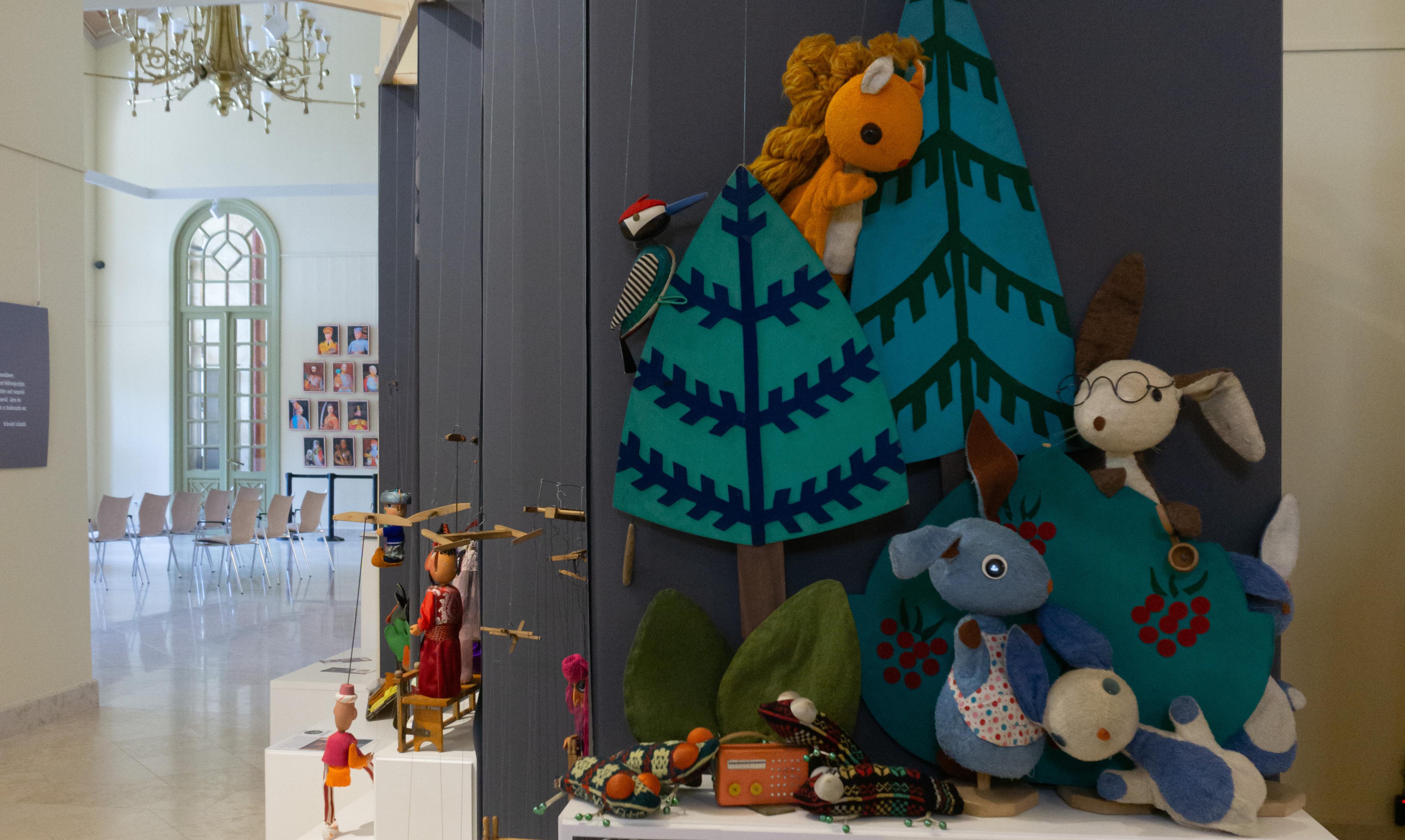
TRY IT

ZSOLT PETHŐ (1937–2016)
Zsolt Pethő studied conducting and composition at the Béla Bartók Secondary School of Music from 1952 to 1960. From 1960 to 1962, he was a music collaborator at Hungarian Radio. His career as an animated film composer began in 1961. As the music consultant for Pannónia Film Studio from 1962 to 1996, he supervised music recordings and dubbing for both domestic and international films. Among others, he composed music for the animated films of Attila Dargay, Ottó Foky, József Nepp, Marcell Jankovics, and Béla Ternovszky. His name is associated with several animated series and films, including “Gustave,” “Frakk, the Cat’s Nightmare,” “MirrMurr, the Tomcat’s Adventures,” “Water-Spider, Wonder-Spider,” “The Littlest Ugrifüles,” “Tales of Crow Hill,” “Pom Pom’s Tales,” “The Great Angler,” “Curious Fáncsi,” “Vackor in the First Grade,” as well as the animated films “Szaffi,” “Captain of the Forest,” “Willy the Sparrow,” and “Mouse’s Escape”. He also frequently worked as a composer for puppet shows. In recognition of his work, he received the Pannónia Award in 1991, the Silver Cross of Merit of the Republic of Hungary in 2005, and the Balázs Béla Award in 2013.
He maintained a continuous collaboration with the Astra Puppet Ensemble, composing music for several of their productions. His melodies for “The Little Rooster’s Diamond Half-Penny,” “Búbos Knight,” “Proverbs,” and “A Boy is Born” enhanced the mood of the scenes and contributed to the success of the performances.
EDE TARBAY: THE LITTLE ROOSTER’S DIAMOND HALF-PENNY
DESIGNER: IVÁN KOÓS| MUSIC: ZSOLT PETHŐ DIRECTOR: LÁSZLÓ VÍZVÁRI
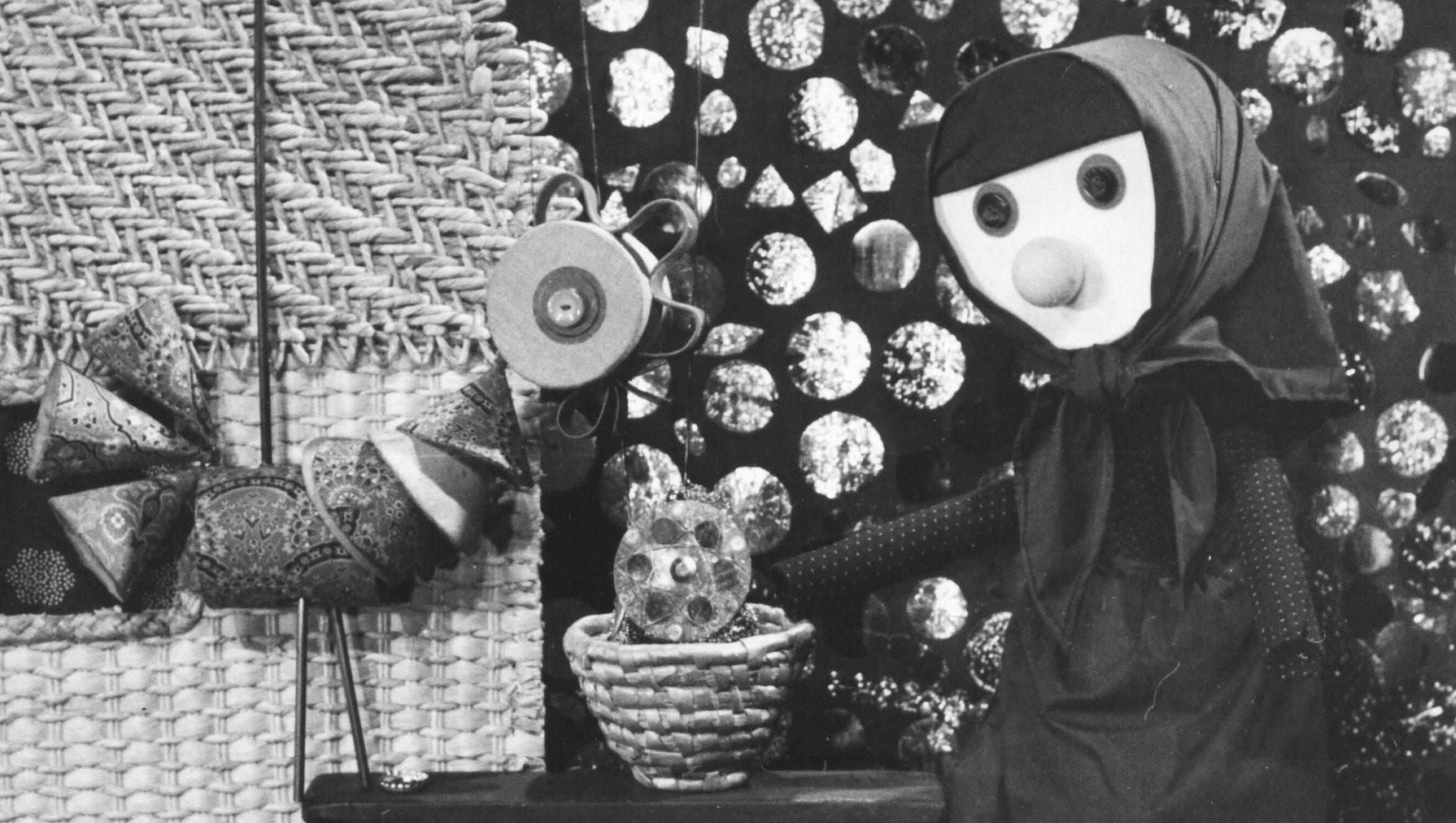
Little Rooster: Fill my belly
With treasure plenty,
As much as you can carry, We’ll leave swiftly,
Cock-a-doodle-doo! Turkish Sultan! This is your fate, For boasting so great, I say, with a voice true! Cock-a-doodle-doo! When she sees it, She won’t regret, My poor lady so dear, That her scrappy Little chappy
Scratched the rubbish heap near.
(...)
Lady:
My dear little rooster, My stubborn dear, Who brought a pile of treasure here, When I wanted just a chick, you see, So I’ll share the wealth in here, Others should live well, as we, While we live, it’s enough, you see, The worth of the half-penny. No more worries will I hold, Just this one thing, to be told: Nothing’s dearer than a rooster bold!
DESIGNER: IVÁN KOÓS
DIRECTOR: LÁSZLÓ VÍZVÁRI

“As a new children’s program, we used the radio play version of the Hauff tale Little Mukk. The puppet stage resembles a sedan chair, brought in by the players. By opening the two shorter sides, it transforms into a three-part playing area where the story unfolds here and there. (...) The disassembled stage fit into Uncle Laci’s Trabant Kombi, so transportation was not a problem. We participated with this piece in 1990 at the IX International Children’s Puppet Festival in Békéscsaba. In the program booklet, Uncle Laci writes that this is not a so-called ‘festival piece,’ but an experimental play for a small stage. It is also experimental in terms of how to create a puppet show based on a radio play.” (Antónia Ősz Szabó and Annamária Zoltán, From Dawn to the Stars, 2013) WILHELM
VERONIKA MARÉK: THE MUSICAL BOX
DESIGNER: ANTÓNIA ŐSZ SZABÓ DIRECTOR: LÁSZLÓ VÍZVÁRI
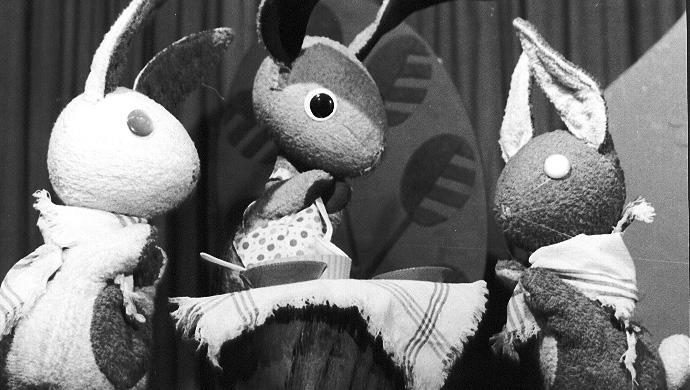
Mama: Time to sleep.
Kuckuc: I don’t want to sleep!
Kickic: Me neither! (They start crying.)
Mama: You know very well that you need to rest a little after lunch. Kickic: But just a little!
Kuckuc: Just a tiny bit. As small as a poppy seed.
Mama: Just that small, just come on now!
(They go into the bush, and the two bunnies lie down with sighs.)
Kickic: Achoo!
Mama: Kickic, come here! (She wraps the bunny in a long red scarf.) Rest now. (Leaves.)
Kuckuc: Mommy!
Kickic: Mommy, tell us a story about Captain Bunny!
Kuckuc: The one where he defends the sandcastle!
Kickic: No, the one where he defeats the sly fox!
Mama: I won’t tell you about Captain Bunny because I’m very tired. Sleep well!
Kuckuc: She won’t tell us!
Kickic: No.
Kuckuc: Hey, Kickic, I want to be a hero like Captain Bunny!
Kickic: Me too, me too! Achoo!
Kuckuc: Come on, Kickic, let’s go!
Kickic: Where to?
Kuckuc: Let’s do a heroic deed.
Kickic: Okay, okay, great! (Trips over the scarf.) Just take this scarf off me! (Kuckuc unwinds the scarf.) Now we can go!
(They sneak out of the bush carefully while Mama isn’t looking.)
Kuckuc: Run! (They run to the right into the forest.)
Mama (tiptoes back in): They’re sleeping, shh. What is this scarf doing here? They’ve escaped! Kickic! Kuckuc! Come back! Oh, what should I do? Kickic will catch a cold without the scarf! And the forest is so dangerous! I must go after them. My little bunnies! My little darlings! (Picks up the scarf and heads into the forest.)
GIANNI RODARI: LITTLE ONION
DESIGNER: IVÁN KOÓS DIRECTOR: LÁSZLÓ VÍZVÁRI

Narrator: Once upon a time, not so long ago, a cheerful little fellow visited the Italian children. Do you know what his name was?
Little Onion: (pokes his head out from the curtain) Cipollino! (and quickly hides again)
Narrator: (doesn’t notice) Yes, Cipollino. Cipollino doesn’t sound so strange, you might think, since it’s an Italian name. But it’s strange even for Italians. Because it means: Little Onion: (pokes his head out again for a moment) Little Onion!
Narrator: Interesting. You really know Italian! Well, today’s play shows the adventures of this fellow. Who he met, how he helped the good ones, and how he punished the bad ones. The other characters in the play are also old acquaintances of yours. For example, the kind Master Apple (the characters briefly appear in the curtain opening) and his neighbour, Master Pear, who—you’ll see—plays the violin quite beautifully. Little Radish is a very sweet girl, she’s the niece of Big White Radish. In the story, she becomes a good friend to both Little Onion and Cherry, the little prince, who, despite his high rank, is a very decent little buddy. You’ll see. But the story also features some evil and foolish... Little Strawberry: (pokes her head out) Oh, Mr. Narrator, you forgot about me!
Narrator: Indeed. Look at that. This is Little Strawberry, the maid of Princess Marshmallow. I believe you will all take her to your hearts as well. (Little Strawberry away.) But this is not something we can say about the wicked Prince Candy. The same candy that, if you eat too much of it, gives you a stomach ache, thirst, and cavities. Princess Marshmallow is just as useless a creature, not to mention her manager, Mr. Cake, and her two profit-seeking friends, Baron Wafer and Count Marzipan.
GYÖRGY SZÁRAZ: CUNNING PÉTER
DESIGNER: ANTÓNIA ŐSZ SZABÓ DIRECTOR: LÁSZLÓ VÍZVÁRI

Péter: Oh no, I’ve received the third beating as well, my life is over. But what am I standing here for if I’m already dead? You are a widow now, Sára, my dear, my wife! (Falls backward.) May I rest in peace.
Student: (Enters singing. Sees Péter lying on the ground.) Why is this lying here in the road? (Walks around and examines him.) Hey, brother! Are we tired or what?
Péter (lying down): There is no talking with a dead man, you hear!
Student: Well, well! So, you’re dead?
Péter: That’s right.
Student: And how do you know?
Péter: Because I’m not alive. If I’m not alive, I’m dead, right?
Student: That’s true. But the dead don’t speak.
Péter: That’s what I’m saying. That’s why I’m not answering you. Being dead is bad enough for me. My poor wife, Sára, doesn’t even know yet. You could let her know that I send my regards from the other world. And that she should come and bury me properly, as is fitting.
Student: I know something better than that.
Péter: Oh, what?
Student: I’ll resurrect you.
Péter: Oh, come on. You’re joking with me in vain, I was a very clever man in my life. They even called me Cunning Péter.
Student: Well, I believe that. But just turn onto your stomach.
Péter: Why?
Student: You’ll see.
Péter: Well, I can do that much. (He turns onto his stomach. The student gives him a hard whack on his butt with his stick. Péter jumps up screaming.) Ouch!
Student: See, I resurrected you!
Péter: How do you know?
Student: Because you’re standing. A dead man doesn’t stand.
Péter: That’s true. So, I really have been resurrected?
GYULA URBÁN:
PETER THE SMURF
DESIGNER:
DIRECTOR:
IRMA TAKÁCS
GYULA URBÁN

1st Dog: What’s going on?
2nd Dog: Hooray! Hooray! Hooray!
3rd Dog: Don’t you know? We have little siblings! Shh! Be quiet. Shut your mouth! Can’t you hear anything? (water) Haha! (The mother is washing them.)
Mama: Hello, children! Well, well! Look at that, you do listen to good words after all. And now pay very, very close attention. I’m introducing your new siblings.
1st Dog: Is this our little sibling too?
Mama: Of course. Just look at how cute it is! What’s wrong, children? Don’t you like it? Füles, come here! Look at its ears! They hang just like yours. Sniffer, its nose is just like yours. Exactly like a little black button. But look at him, children! Isn’t he exactly like you? He has ears, a tail, eyes, and a nose. What more do you want?
1st Dog: But his fur—his fur is BLUE!
EDE TARBAY: VALIANT BÚBOS
DESIGNER: ANTÓNIA ŐSZ SZABÓ | MUSIC: ZSOLT PETHŐ
DIRECTOR: LÁSZLÓ VÍZVÁRI
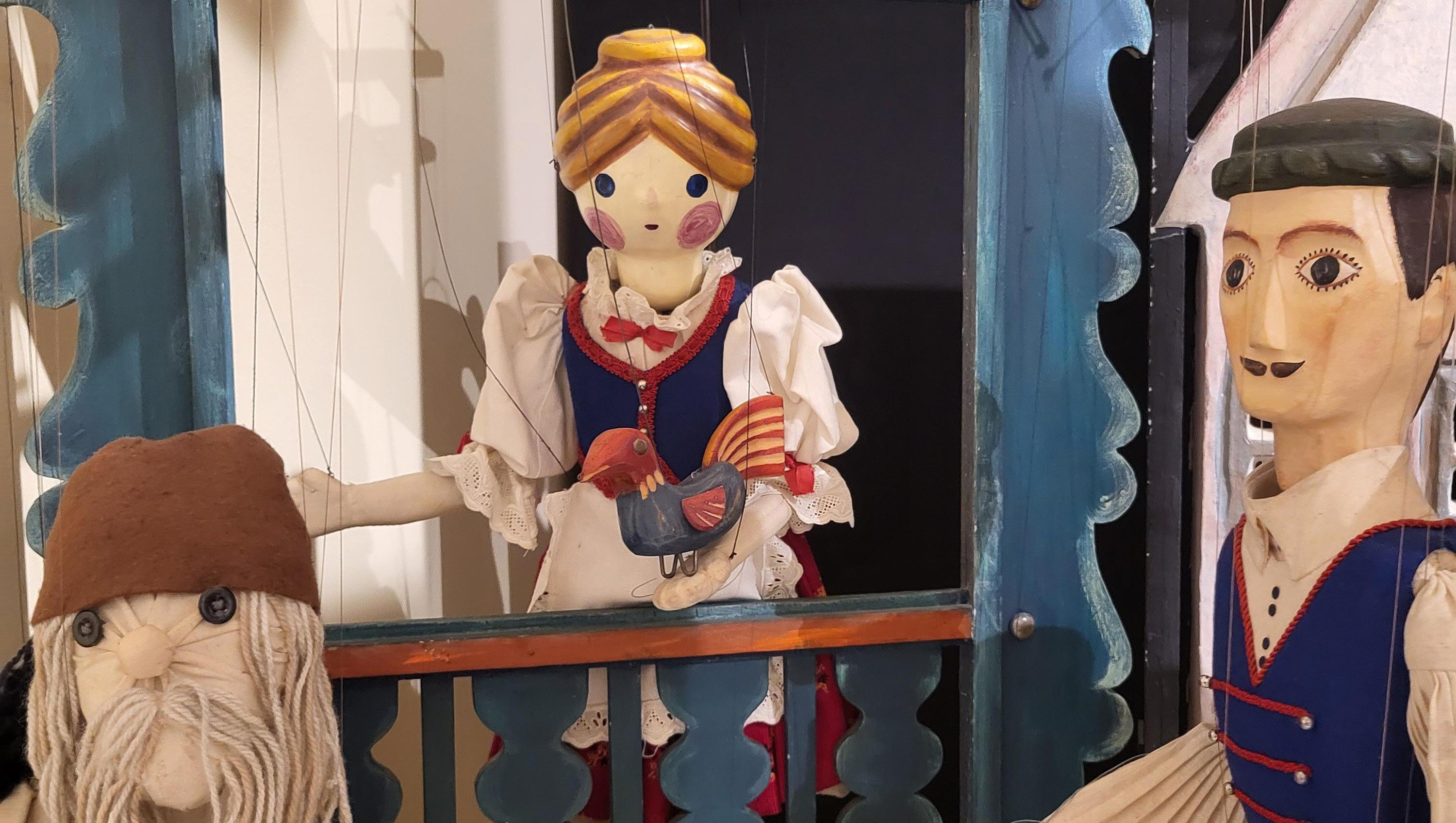
Sky-touching: We have a rare guest in our midst. (points to Búbos) Who, despite coming from the land of Hujki, seems to be honest. Therefore, I believe we will assist him in achieving his goal.
Fox: Speak, then, what is your goal, rare guest?
Búbos: I would like to return to the petty king of Hujki to lead the pricked people in his court to a better fate.
Jay: (flies over them) Lórika! Lórika! Lórika!
Sky-touching: Our esteemed guest is also in love with the good daughter of that bad king. (Animals jostle, nodding their heads left and right.)
Fox: I see.
Búbos: I was brought here in a sack by two giant soldiers. Having toppled them, our chief scared Mr. Bear, and they are probably already running home. If we don’t hurry, King Hujki will gather an army against us.
Fox: What do you propose then?
Búbos: First, I propose that a courier be sent from here to the court of Hujki. Turn to my old father with the message that the people should wait for us, for we will bring them joy!
Fox: And after that?
Búbos: After that? Well, after the courier, we shall also set off.
Doe: And what about the good girl?
Buck: Well, he will ask for her hand!
Squirrel: (eagerly volunteers) I will ask for her hand on his behalf! (...)
Sky-touching: (to Fox) Minister Fox, you will lead the matter to victory!
Fox: It will happen, Sky-touching Great Manuel!
Sky-touching: (to Búbos) And to you, Antal Búbos, I offer a friendship treaty. Whatever happens, let this be your guiding principle.
Búbos: Thank you. I will not make a mistake.
Sky-touching: (rises, shakes hands with Búbos) So be it!
Búbos: So it will be.
THE SEVEN PRINCES
PUPPET DESIGNER: ANTÓNIA ŐSZ SZABÓ | SET DESIGNER: IVÁN KOÓS DIRECTOR: IVÁN KOÓS AND LÁSZLÓ VÍZVÁRI

“In this play, we experimented again with a new style of play. The designer created the figures from coloured textile overlays on a vertically held black background that completely conceals the puppeteer. The result was highly decorative puppets and an interesting, flat-moving play.” (László Vízvári)
“The internationally renowned Astra welcomed the participants of the event with a new play. This ensemble, always creating something new in puppetry, presented Béla Balázs’s puppet play ‘The Seven Princes’ on stage. Their performance embodied the author’s thoughts and pure humanity in unique symbolism, well-developed game culture, and uninterrupted beauty of its colour and form.”
(Vincéné Mészáros, Népművelő 1975) BÉLA BALÁZS – IVÁN KOÓS:
